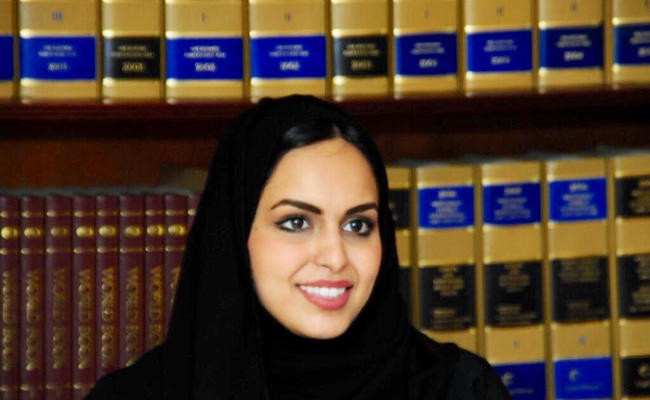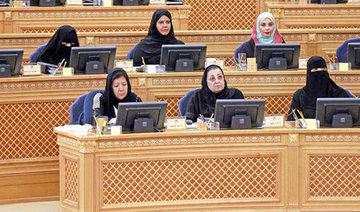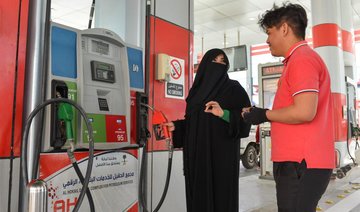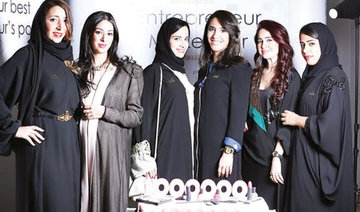JEDDAH: Often classified as oppressed, persecuted and crushed by the ultra-conservative, male-dominant society, Saudi women must take a stand against the misconceptions and false stereotypes many have of them.
Times have changed in the Kingdom, and Saudi women are gaining more and more rights — something much of the world is still ignorant about.
Many people around the world have been fed wrong ideas about Saudi Arabia’s 32 million population, of which nearly half are women, according to a Step Feed report citing the Saudi General Authority for Statistics.
Women in the Kingdom can and do open their own bank accounts without the need for a male guardian’s permission, contrary to several false reports by renowned media outlets.
Women do have the authority over their own bodies and health as elective surgeries or medical treatments can be freely sought without permission from a male guardian.
“The Law of Practicing Healthcare Professions in Saudi Arabia states in article 19 that the competent patient has the right to decide on the surgery, it means that it applies for both genders,” Dima Talal Al-Sharif, a lawyer at the Law Firm of Majed Garoub in Jeddah, told Arab News.
Since the historical royal decree on September 26 last year allowing women to drive, obtaining a driver’s license does not require a guardian’s consent. “Saudi women are allowed to get a driver's license without permission from a legal guardian,” said Al-Sharif.
Since 2006, Saudi women have been able to apply for their own personal identification cards too, she added.
“As per the King’s instructions, Saudi women will be allowed to issue and renew their own passports without the guardian's permission very soon, in addition to studying abroad and traveling without their guardian's permission,” according to Al-Sharif.
“Some Saudi families allow their daughters to travel abroad without a male companion, be it for tourism or treatment,” said Riham Al-Saadi, 27, a Saudi national who has traveled to several countries without her male guardians. Al-Sharif agreed, saying that some Saudi families allow their daughters to travel alone through the electronic travel permission.
Saudi female lawyers can also plead in Saudi courtrooms, a change that came about after 2013 when the first female trainee advocate was registered, achieving a significant victory for women who were subsequently allowed to practice as lawyers.
Jeddah-based attorney Bayan Zahran became the first Saudi woman to open a law firm in January 2014.
Al-Sharif also pointed out that women have the right to issue a power of attorney by themselves.
Women are also allowed to start their own businesses without the need for a male guardian’s permission, be it a husband, father, brother or even son, explained the lawyer citing the Ministry of Commerce and Investment.
As for renting apartments and cars, Al-Sharif said, “King Salman ordered all women’s procedures to be facilitated since having their own national ID. So she has the right to rent an apartment or even a car. However, most rental offices ignore this and never apply it and require a male guardian’s [permission].”
Applying for a job is another basic right that Saudi women enjoy without the interference of a male guardian.
Claiming that women cannot mix with the opposite gender is not entirely true. While it applies in some workplaces, men and women do interact in public place like malls, restaurants and universities, where female students in Saudi universities have male instructors in classes.
Saudi courts sometimes also grant mothers custody of their children in cases where the father is found ineligible, Al-Sharif added.
Wearing a full-length black abaya is not mandatory in the country either. Women still can wear colorful robes without headscarves in some big cities like Jeddah and Riyadh. Medicine students and nurses publicly move around the hospital grounds wearing a white lab coat.
Al-Saadi said one of the biggest misconceptions she has heard about Saudi women is that they are not allowed to leave the house and they only “cook and obey men”.
“This is very wrong. Thankfully, we are living our lives to the fullest, and all these wrong ideas about us do not exist on the ground.”
A documentary about women in Saudi Arabia would be a good way to educate people, she suggested. “A documentary that shows our lives, how we are happily living. I think this is the fastest way to correct the misconceptions about us.”
Al-Sharif, the lawyer, believes that some of the misconceptions come from women's own lack of awareness of their rights.
In July 2016, an app called “Know Your Rights” was launched by Saudi lawyer Nasreen Alissa, to help spread awareness among her peers.The media plays a major role in marketing inaccurate information and claims too, said Al-Sharif.
“The solution to raise women’s awareness of their rights can be the media itself, through the proper coverage of women's empowerment and the correction of the inaccurate information.”
Her advice to Saudi women is to be more vocal about their rights.
“As a Saudi woman, it’s your turn now to look for rights and to make sure that such rights are known and applied.”
Time for Saudi women to be more vocal about their rights
Time for Saudi women to be more vocal about their rights

Teucrium Oliverianum plant helping mitigate desertification in Saudi Arabia’s north

- Variedly known to locals as al-aihlan or ahneh, the perennial herbaceous plant has now spread extensively throughout the Imam Turki bin Abdullah Royal Reserve
RIYADH: The perennial herbaceous plant Teucrium oliverianum has spread extensively throughout the Saudi Arabia's Imam Turki bin Abdullah Royal Reserve, indicating a balanced ecosystem, the Saudi Press Agency has reported recently.
Citing experts, the report noted that the reserve has seen a remarkable expansion in its vegetation cover and "has now reached its best condition since its establishment in 2018." It also indicates a healthy, stable vegetation cover, and soil free from erosion or desertification.

Variedly known to locals as al-aihlan or ahneh, the plant is characterized by long, thin stems and delicate leaves, coated with fine bristles that help minimize water loss, adding to its adaptability to harsh environments.
Native to the Arabian Peninsula, the plant is highly valued for grazing. It also provides shelter and sustenance for various small desert animals and insects, making it an essential part of the natural food chain.
In an earlier report, SPA quoted wild plant expert Abdullah Al-Barrak as saying Teucrium oliverianum is also a valuable food source for honeybees.

Renowned for its evergreen or semi-evergreen leaves and striking blue-violet flowers, the plant has become an iconic symbol of the flora of the Imam Turki bin Abdullah Royal Reserve.
The 91,500-square-kilometer reserve, formerly known as Al-Taysiyah Natural Reserve, is the second-largest royal reserve in the Kingdom, spread across regions of Hail, Qassim, Al-Jouf, Northern Borders and Eastern Province.
The reserve's vegetation cover has surged from 1.5% in 2018 to an impressive 6.7%, and now boasts over 179 plant species, including 113 seasonal and 66 perennial varieties, officials have said.
How a Saudi AI startup seeks to streamline recruitment, spur entrepreneurship

- AIYAH offers access to opportunities, ideas and connections for startups, investors and professionals worldwide
- Company’s mission aligns with Vision 2030 goals, supporting Saudization, facilitating investment opportunities
RIYADH: Artificial intelligence is driving Saudi Arabia’s entrepreneurship growth, with startup founders using the technology to address local challenges, boost efficiency, and advance Vision 2030’s economic goals. Benefiting from supportive government policies and emerging talent, these startups are positioning the Kingdom as a rising global tech hub.
One such firm is AIYAH, which is using AI to bridge the gap between startups, talent, investors and academia. The company’s mission aligns with Vision 2030’s goals, supporting Saudization and offering a gateway to authentic Saudi experience.

“Accelerating the achievement of the goals of Vision 2030 has to be number one,” AIYAH co-founder and CEO Sahiqa Bennett told Arab News.
“That’s basically why AIYAH was built, to accelerate the process. Those goals are linked with innovation, getting innovative startups in or solutions that they are looking for and talent.”
Founded in 2024 by Bennett and Naila Kiani, AIYAH serves as an AI-powered talent solution and a gateway to the Kingdom’s innovation ecosystem.

Before launching the platform, Bennett spent more than two years researching the virtual world and ways to connect it with the physical arena for human interaction.
Bennett explains that her decision to co-found AIYAH stemmed from frequent questions she received about her fascination with Saudi Arabia and its booming tech scene.
“Why are you looking to be in Saudi Arabia? Why come to Saudi Arabia so much, and what’s happening in the Middle East that’s not happening here?” she said. “People almost didn’t believe some of the things I was telling them.”
Through her research, Bennett was struck by how many people did not fully understand Vision 2030, despite being familiar with its broader concepts. Many were unsure of how to tap into the opportunities emerging within the Kingdom.

She notes that her research process included “talking to people in the Kingdom and out of the Kingdom, asking if they know enough about Saudi and Vision 2030.”
Several other factors influenced Bennett’s decision to co-found AIYAH, with one of the most pressing being the challenge of finding and placing the right talent.
She encountered many stories of recruiters attempting to fill thousands of positions — sometimes as many as 10,000 — but struggling to identify suitable candidates.
At the same time, she frequently heard from job seekers trying to enter the Saudi market through traditional platforms such as LinkedIn, only to receive no responses or interview opportunities.
“I thought I need to build the gateway that literally opens the door and welcomes you in, gives you a chance to see what’s happening, and accelerates how you get involved and how you become visible, and have a chance at least,” she said.
This disconnect between recruiters and job seekers revealed a broader inefficiency in the hiring process. Bennett emphasizes how difficult it is for applicants to stand out when they are competing with hundreds — or even thousands — of others for the same opportunity.
Saudi Arabia had an overall unemployment rate of 3.7 percent in the third quarter of 2024, down 0.5 percentage points from the same period in 2023, according to the General Authority for Statistics.

This improvement came alongside a rise in overall labor force participation — including Saudis and non-Saudis — which reached 66.6 percent, reflecting a year-on-year increase of 0.2 percentage points and a 0.4-point gain from the previous quarter.
On the employer side, Bennett notes that recruiters were overwhelmed. Many simply could not manage the volume of applicants, making it difficult to identify the right candidates amid overflowing inboxes and unfiltered submissions.
“There are so many parts to the recruitment process that are just so disheartening,” she said.
“We’re trying to put dignity back into the process,” she added. “It’s actually disheartening applying for jobs and not hearing back and getting the feeling that you’re not good enough.
“I’m trying to flip that around and say let the opportunities come to you, whether you are a startup founder, whether you’re an investor, or whether you’re talent. Let the pitch happen, and then you pick from the pool.”

AIYAH leverages AI to streamline connections between investors, employers and job seekers. Rather than requiring users to apply for hundreds of positions — often alongside thousands of competitors — the platform offers an AI-powered interview feature.
This tool allows individuals to present themselves through video, giving employers and investors a more personal and direct introduction. This innovation, Bennett explains, was inspired by a gap in existing platforms.
“I’m going to combine the best pieces of certain platforms,” she said. “I feel like there’s nothing that brings everyone together as a community — but with intention, community with intention.”
Expanding on what sets AIYAH apart from traditional job platforms such as LinkedIn, Bennett points to its proactive approach.
“How we are different is we are guaranteeing that everyone can do an interview. Come to the platform, register, and do an interview,” she said. “You don’t even have to wait for a job, introduce yourself and be proactive so that you get seen.
“And I think this is the biggest difference.”

Bennet acknowledges LinkedIn’s strengths, particularly in building human connections, but says its functionality in the hiring space leaves much to be desired.
“I think there are some great things about LinkedIn, but when it comes to recruitment and hiring, I call it a black hole — I call it where things get lost,” she said.
Bennet argues that while LinkedIn has not evolved significantly in two decades, the world — and its hiring needs — have.
“And that is the difference,” she said. “I feel that their models have not changed — LinkedIn is a 20-year-old business and they don’t need to disrupt or change because they are making money.
“However, the world has changed … and people’s needs have changed.”

She added: “I think the traditional model has been broken for a very long time. I think the human part of things has to really remain.”
Bennett says LinkedIn still serves a purpose when it comes to networking and social connectivity. But, according to her, in the realm of recruitment both job seekers and hiring professionals are growing increasingly frustrated with its limitations.
That commitment to accessibility is rooted in more than two years of research into evolving market needs. Since its recent launch, AIYAH has focused on bridging gaps between startups, talent and opportunity through a phased rollout strategy.
DID YOU KNOW?
• Saudi Arabia's employment rate dropped slightly to 64 percent in Q4 2024, down from 64.1 percent in Q3 2024.
• From 2017 to 2024, the average employment rate in Saudi Arabia was 56.7 percent, peaking at 64.7 percent in Q4 2023.
• The unemployment rate among Saudis rose to 7.8 percent in Q3 2024, up 0.7 percentage points from the previous quarter.
(Sources: Trading Economics & GASTAT)
In its first phase, the platform allows startups to join and job seekers to pitch themselves and apply for roles. The next phase will expand to include investors and employers, alongside partnerships with global hubs and both local and international universities.
“We are doing it in phases, we are inviting companies that are aligned with Vision 2030, namely deep tech and startups from around the world,” Bennet said. “The conversations that we are having now involve more than 5,000 startups from around the world entering the Kingdom.”
“On the side, this is really big,” she added. “We are looking at Saudization, graduate programs, and high-level bespoke requirements as well for certain projects.”

The company’s mission is grounded in five core pillars: advancing the goals of Vision 2030, supporting Saudization, fostering a stronger startup ecosystem, facilitating licensing and investment opportunities, and offering a realistic lens to view Saudi Arabia’s ongoing transformation.
It also seeks to challenge global misconceptions about the Kingdom while empowering employers to adopt AI in meaningful ways.
Through its AI-powered hiring model, AIYAH aims to accelerate human capital development and expand both investment and recruitment potential within the country.
Bennett also stresses the importance of ensuring that no demographic is left behind as AI reshapes industries. During the interview, she made clear that inclusivity is a key priority for the company.
Looking ahead, AIYAH plans to deliver AI literacy and digital skills to older or less tech-savvy people, ensuring the platform remains accessible and supportive of a truly inclusive future of work.
A Saudi doctor’s inspiring journey of overcoming her disability

- Dr. Bashair Ibrahim overcame prejudice and lack of accessibility to achieve career success
- Pediatrician hopes to address misconceptions about people with disabilities
RIYADH: Dr. Bashair Ibrahim is a symbol of hope, a testament to the strength of the human spirit, and a living example of perseverance.
Her story of overcoming disability is an inspiration to anyone who has faced adversity.
Ibrahim spoke to Arab News about how she navigated a challenging career, fueled by unwavering determination and a profound passion for healing.
“One of the most rewarding aspects of working as a pediatrician is the opportunity to care for children, especially at such a young age when they haven’t yet formed judgments or perceptions about disability,” Ibrahim said.
“I find that my connection with them is pure and genuine; they see me for who I am, not for any physical limitations. We build trust and warmth in a very natural way.”
Ibrahim’s journey, marked by both triumphs and systemic barriers, offers a vital perspective on inclusivity, accessibility, and the importance of challenging societal norms.
Her interest in medicine was sparked early, spending time around medical equipment due to mobility challenges.
“As a result of being in a car or using a wheelchair, I started to see a lot of machines, a lot of devices, X-rays, devices they use, needles,” she explained.
This ignited curiosity, leading her to explore the intricacies of the human body and medical science. This was not a deterrent; it fueled her path to healing.
“These experiences from a young age make one stronger,” she said.
Her fascination with science continued, and she began volunteering for lab activities — excelling in biology. This early experience combined with an interest in medical dramas solidified her career aspirations. The allure of understanding the human body and alleviating suffering proved irresistible.
“I liked the science itself,” she recalled. “I was learning more about humans, about how organs work, what diseases can come from that.”
Applying to medical school presented hurdles. Many universities lacked accessibility for individuals with mobility impairments.
She recounted a disheartening experience at one university where the main entrance was only accessible via a long staircase.
Despite finding an alternative route, the dean still denied her access citing concerns about opening hours.
This highlighted a frustrating reality: systemic biases can hinder progress, even when solutions exist.
Undeterred, Ibrahim sought admission to another private university. The director made a comment that stuck with her, asking: how would a patient treat a patient?
For Ibrahim, this dismissive remark is one example of societal biases surrounding people with disabilities in healthcare.
It underscored the need to challenge preconceived notions and recognize potential regardless of physical limitations.
“It never made sense then, it doesn’t make sense now,” she said, emphasizing the enduring impact of prejudice.
Despite these obstacles, Ibrahim remained committed. She specialized in pediatrics, driven by a deep-seated desire to positively impact children’s lives.
“What also makes this work deeply meaningful is the respect I often receive from families,” she explained.
“Many parents have told me they admire the way I’ve pursued a career in medicine despite the challenges that come with having a disability.
“Their appreciation reminds me that I’m not only helping their children medically, but also offering a visible example of resilience and determination.
“That mutual respect, and the human connection it fosters, is something I treasure deeply in my work.”
Ibrahim is acutely aware of misconceptions surrounding doctors with disabilities.
“One of the biggest misconceptions about doctors with disabilities is the stereotype that we are limited in our ability to practice medicine effectively,” she noted.
“I often notice surprise when families meet me for the first time, but I see that as a chance to challenge those assumptions through my work.”
She has adapted her approach to ensure her disability does not compromise care quality.
“I perform the full physical examination while seated, and I’ve adapted my approach to ensure that nothing is compromised in the quality of care I deliver.
“Over time, families come to see that my disability doesn’t define my capability.”
She believes that mentorship is crucial for aspiring medical professionals with disabilities, emphasizing the importance of role models who understand both the clinical demands and personal challenges they face.
Her message is clear: equal access, thoughtful accommodations and representation are essential, and her story is a testament to how people can overcome barriers and achieve their full potential.
Jazan University foreign scholarship scheme thriving as intake hits 2,100

- 344 students from 20 countries enroll in 2025
- Program provides platform for boosting cultural understanding, intellectual moderation
RIYADH: Jazan University enrolled 344 students into its foreign scholarship program this year, taking the total since its inception to 2,100.
The latest intake represent more than 20 countries, including France, Canada, the Russian Federation and several Arab, African and Asian nations, the Saudi Press Agency reported.
As well as helping the university to increase its global standing, the program provides a platform for enhancing relationships between people from around the world, and nurturing cultural understanding and intellectual moderation, the report said.
Jazan University is regarded as a leading scientific institution within the Kingdom and the wider Arab world. It champions the message of Islam and the teaching of the Arabic language, while promoting the values of moderation, balance and understanding among people.
As well as the educational benefits, students enrolled on the scholarship program have access to a comprehensive healthcare package, which includes their accompanying family members, and various financial support options to cover shipping costs and the purchase of relevant materials and equipment.
The university also provides free flights home at the end of each academic year to ensure its students’ well-being.
A recent beneficiary of the scheme is Obaidur Rahman Abdul Hannan.
“This is an important academic project, which not only helps the meritorious students but also serves the purpose for achieving cultural understanding and intellectual moderation, making it an ambitious project deserving praise and appreciation both locally and internationally,” he told Arab News.
“Saudi Arabia is emerging as a global hub for higher education, offering a plethora of fully funded scholarships to international students across various disciplines.
“These scholarships by Jazan University, with excellent facilities, bearing all expenses, flight tickets, provide an excellent opportunity for non-Saudi students … to pursue various courses in such a prestigious university.”
Riyadh man faces prosecution for selling counterfeit pharmaceuticals

- SFDA said that violations pose a great risk to the health and safety of consumers
- SFDA also requested the public’s cooperation by reporting any observable violations
The Saudi Food and Drug Authority has referred the representative of a commercial establishment in Riyadh to the Public Prosecution after he was found to be involved in the sale of a counterfeit pharmaceutical product.
The act is a direct violation of the Pharmaceutical and Herbal Establishments and Products Law in the Kingdom, which mandates a penalty of up to 10 years’ imprisonment and a fine of SR10 million ($2.6 million), the Saudi Press Agency reported.
The SFDA highlighted the importance of strictly adhering to the laws and regulations put in place to ensure the safety and quality of products circulating in the Saudi market.
The authority said that violations pose a great risk to the health and safety of consumers, warranting the enforcement of legal penalties against offenders.
The SFDA also requested the public’s cooperation by reporting any observable violations in establishments under its supervision to the toll-free line 19999, in an effort to strengthen oversight and safeguard public health.






















